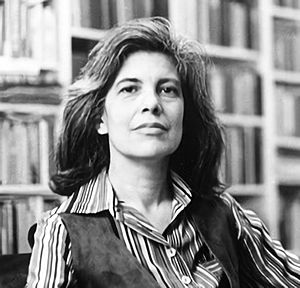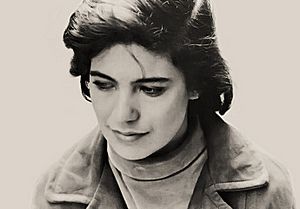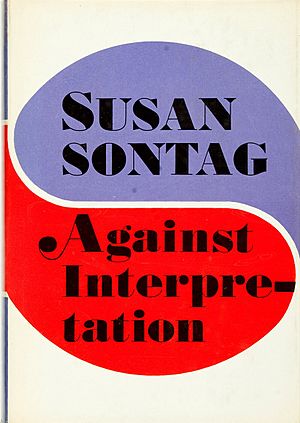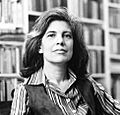Susan Sontag facts for kids
Quick facts for kids
Susan Sontag
|
|
|---|---|

Sontag in 1979
|
|
| Born |
Susan Rosenblatt
January 16, 1933 New York City, U.S.
|
| Died | December 28, 2004 (aged 71) New York City, U.S.
|
| Resting place | Montparnasse Cemetery, Paris, France |
| Education | University of California, Berkeley University of Chicago (BA) Harvard University (MA) |
| Occupation | |
| Years active | 1959–2004 |
| Known for |
|
| Spouse(s) |
Philip Rieff
(m. 1950; div. 1959) |
| Partner(s) | Annie Leibovitz (1989–2004) |
| Children | David Rieff |
Susan Sontag (born January 16, 1933 – died December 28, 2004) was an American writer, philosopher, and political activist. She was known for her essays, but she also wrote novels and directed films. Her first important work, the essay "Notes on 'Camp' ", came out in 1964.
Some of her most famous books include Against Interpretation (1966), On Photography (1977), and Illness as Metaphor (1978). She also wrote popular novels like The Volcano Lover (1992) and In America (1999).
Sontag often wrote and spoke about important world events. She traveled to places facing conflict, like during the Vietnam War and the Siege of Sarajevo. She wrote a lot about photography, culture, media, illness, human rights, and politics. Her writings and speeches sometimes caused debate, but she is remembered as "one of the most influential critics of her generation."
Contents
Early Life and Education
Susan Sontag was born Susan Rosenblatt in New York City. Her parents, Mildred and Jack Rosenblatt, were Jewish and came from Lithuania and Poland. Her father managed a fur business in China. He died when Susan was five years old.
Seven years later, Susan's mother married Nathan Sontag. Susan and her sister, Judith, took his last name. Susan did not grow up with a religious background. She later said she didn't visit a synagogue until she was in her mid-20s.
Sontag remembered her childhood as unhappy. Her mother was often away and seemed distant. Susan lived in Long Island, New York, then in Tucson, Arizona, and later in southern California. She found comfort in books and finished North Hollywood High School at age 15.
She started college at the University of California, Berkeley. Then she moved to the University of Chicago because she admired its strong study program. At Chicago, she studied philosophy, ancient history, and literature. She learned from famous teachers like Leo Strauss and Kenneth Burke. She earned her degree at 18 and was chosen for Phi Beta Kappa, a top academic honor society.
At 17, Sontag married Philip Rieff, a sociology teacher at the University of Chicago. They married after knowing each other for only 10 days. Their marriage lasted eight years. After finishing her degree, Sontag taught English at the University of Connecticut for a year. She then went to Harvard University for graduate school. She first studied literature, then moved to philosophy and theology.
After getting her Master of Arts in philosophy, she started working on her doctorate. She researched many areas of philosophy and theology. She helped her husband, Philip Rieff, with his 1959 book Freud: The Mind of the Moralist. She contributed so much that some people consider her an unofficial co-author. Susan and Philip had a son, David Rieff, who later became a writer and his mother's editor.
In 1957, Sontag received a fellowship to study at St Anne's College, Oxford in England. She traveled there without her husband and son. She attended classes with famous thinkers like Iris Murdoch. However, she didn't like Oxford much. So, she moved to the University of Paris (the Sorbonne) in 1957.
In Paris, Sontag met many artists and thinkers. She said her time in Paris was perhaps the most important period of her life. It helped her connect deeply with French culture. In 1959, she moved back to New York. She regained custody of her son and taught at universities while her writing career grew.
Career Highlights
Writing Fiction
While writing her stories, Sontag taught philosophy at different universities. These included Sarah Lawrence College and Columbia University. She stopped teaching in 1965 to become a full-time writer.
At age 30, she published an experimental novel called The Benefactor (1963). Four years later, she published Death Kit (1967). Even though she didn't write many novels, Sontag saw herself mainly as a novelist.
Her short story "The Way We Live Now" was published in 1986 in The New Yorker. It was praised for its unique style and became an important story about the AIDS epidemic. She became a best-selling novelist later in her career with The Volcano Lover (1992). Her last novel, In America, came out in 2000 when she was 67.
Sontag also directed four films and wrote several plays. Her most successful plays were Alice in Bed and Lady from the Sea.
Writing Nonfiction
Sontag first became famous for her essays. She often wrote about how different types of art, from "high" art to "low" art, connect. She helped make "camp" a recognized style with her 1964 essay "Notes on 'Camp' ". This essay showed how art could include common, funny, and exaggerated themes.
In 1977, Sontag published On Photography, a collection of essays. In these essays, she explored how photographs capture the world. She wrote about how travelers and tourists use photos and how we experience the world through them.
Sontag believed that modern photography has created too many images. She said that "just about everything has been photographed." This has changed what we expect to see and what we feel we have the right to look at. She wrote that photos "alter and enlarge our notion of what is worth looking at." They have changed our "viewing ethics." Photos give us more access to history and faraway places. However, she also thought that images might replace real experiences and limit our understanding of reality. She also suggested that photography can make people less sensitive to terrible human experiences.
Sontag continued to write about photography in her 2002 essay "Looking at War: Photography's View of Devastation and Death." She concluded that people remember photos more than the actual stories. She felt that "the photographic image eclipses other forms of understanding—and remembering."
Sontag became a role model for many female writers and feminists in the 1960s and 1970s.
Activism and Impact
Sontag became active in politics in the 1960s. She spoke out against the Vietnam War. In 1968, she visited Hanoi, the capital of North Vietnam. After her visit, she wrote positively about their society in her essay Trip to Hanoi.
In 1989, Sontag was the President of PEN American Center, a major writers' organization in the U.S. When Iranian leader Ayatollah Khomeini issued a death sentence against writer Salman Rushdie, Sontag strongly supported Rushdie. Her support was very important in getting American writers to help him.
During the Siege of Sarajevo in the 1990s, Sontag gained attention for directing a play. She put on Samuel Beckett's Waiting for Godot in a theater in the Bosnian capital. The city had no electricity, so the play was performed by candlelight.
Personal Life and Passing
Sontag's mother died in Hawaii in 1986.
Susan Sontag passed away in New York City on December 28, 2004, at age 71. She died from complications of a blood disorder that turned into leukemia. She is buried in Paris at Montparnasse Cemetery. Her son, David Rieff, wrote about her final illness.
Legacy and Influence
After Sontag's death, Steve Wasserman of the Los Angeles Times called her "one of America's most influential intellectuals." He noted her "passionate engagement" and "ardent activism in the cause of human rights." Eric Homberger of The Guardian called her the "Dark Lady' of American cultural life for over four decades."
Brandon Robshaw of The Independent wrote about Sontag's book Against Interpretation (1966). He said that Sontag was very forward-thinking. Her idea of analyzing popular culture, like the music group the Doors, as well as classic literature, is now common.
Michael Starenko reviewed Sontag's On Photography (1977) in 1998. He wrote that her ideas about photography have become so important that they are now a basic part of how people discuss and understand photography.
Works by Susan Sontag
Fiction Books
- (1963) The Benefactor
- (1967) Death Kit
- (1977) I, etcetera (A collection of short stories)
- (1991) The Way We Live Now (short story)
- (1992) The Volcano Lover
- (1999) In America – This book won the 2000 U.S. National Book Award for Fiction.
Plays
- A Parsifal (1991)
- Alice in Bed (1993)
- Lady from the Sea (1998), an updated version of an old play by Henrik Ibsen.
Nonfiction Books
Collections of Essays
- (1966) Against Interpretation (includes Notes on "Camp")
- (1969) Styles of Radical Will
- (1977) On Photography
- (1980) Under the Sign of Saturn
- (2001) Where the Stress Falls
- (2007) At the Same Time: Essays & Speeches
Sontag also published nonfiction essays in many well-known magazines. These included The New Yorker, The New York Review of Books, and The Nation.
Other Nonfiction Books
- (1959) Freud: The Mind of the Moralist
- (1978) Illness as Metaphor
- (1988) AIDS and Its Metaphors (a follow-up to Illness as Metaphor)
- (2003) Regarding the Pain of Others
Films Directed
- (1969) Duett för kannibaler (Duet for Cannibals)
- (1971) Broder Carl (Brother Carl)
- (1974) Promised Lands
- (1983) Unguided Tour AKA Letter from Venice
Other Works
- (2002) Liner notes for the Patti Smith album Land
- (2004) Contribution of phrases to Fischerspooner's album Odyssey
- (2008) Reborn: Journals and Notebooks 1947–1963
- (2012) As Consciousness Is Harnessed to Flesh: Journals and Notebooks, 1964–1980
Awards and Honors
- 1976: Arts and Letters Award in Literature
- 1977: National Book Critics Circle Award for On Photography
- 1990: MacArthur Fellowship
- 1992: Malaparte Prize, Italy
- 1999: Commandeur des Arts et des Lettres, France
- 2000: National Book Award for In America
- 2001: Jerusalem Prize, given to writers whose work explores individual freedom.
- 2002: George Polk Award for Cultural Criticism.
- 2003: Honorary Doctorate from Tübingen University
- 2003: Friedenspreis des Deutschen Buchhandels (Peace Prize of the German Book Trade)
- 2003: Prince of Asturias Award on Literature
- 2004: Two days after her death, the mayor of Sarajevo announced a street would be named after her. He called her an "author and a humanist" who helped create the history of Sarajevo and Bosnia. In 2010, Theater Square was officially renamed Theater Square of Susan Sontag.
Digital Archive
A digital collection of 17,198 of Sontag's emails is kept at the UCLA Department of Special Collections. This archive helps people study her work.
Films About Susan Sontag
A documentary about Sontag, called Regarding Susan Sontag, was released in 2014. It won a special award at the 2014 Tribeca Film Festival.
In 2023, it was announced that a biographical film about Sontag was being made. It will star Kristen Stewart as Sontag and is based on the book Sontag: Her Life and Work by Benjamin Moser.
Images for kids
See also
 In Spanish: Susan Sontag para niños
In Spanish: Susan Sontag para niños
- LGBT culture in New York City
- List of LGBT people from New York City
 | Bessie Coleman |
 | Spann Watson |
 | Jill E. Brown |
 | Sherman W. White |








